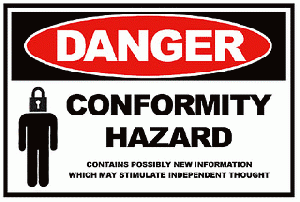[This piece has begun appearing in newspapers in my conservative part of Virginia-- part of my strategy of "See the evil. Call it out. Press the Battle."*]
In a healthy democracy, differing points of view contend to shape the destiny of the society.
What does it mean, however, when a major subculture of that society is perennially of but one mind?
From the 1830s until the Civil War, there was no robust debate in the politics of white Southerners about the rightness of slavery. It was the major issue in the nation as a whole, but within the South one point of view was virtually unchallenged.
Likewise in the 1950s and 1960s, there was no robust debate in the politics of white Southerners about the rightness of resisting the judicial mandate to end the regime of segregation. No major faction emerged to say that the fraud of "separate but equal" was an injustice that should be abandoned.
Most Americans -- including most white Southerners, I suspect -- would agree now that slavery was wrong, Jim Crow was wrong, and desegregation was right. But not at the time, not when it mattered.
Such uniformity of political position is unnatural. It can happen only if people have been taught by the culture not to think for themselves, or taught not to express what they think if it differs from the dogma imposed by their political community.
Either way, it is contrary to how a democracy is supposed to work.
We see that same kind of dogma in the Republican Party of today.
In that party, whose base of power lies in the South, there is no robust debate on a host of important issues that face the nation. Just take a look at the range of views -- or lack of such range -- among the nearly twenty Republican candidates for president.
Although many Republicans feel embarrassed by the intemperance of the statements from Donald Trump, no Republican candidate is advocating anything other than a hard-line, anti-immigrant position.
Surely there should be room in that national party for the more compassionate, path-to-citizenship position that the most recent Republican president, George W. Bush, advocated nearly a decade ago (and that is supported by a majority of the American public). But in the candidate debates, there probably will be near-uniformity on the issue.
(The one outlier, Marco Rubio, has repudiated the immigration reform legislation he proposed in 2013.)
Same with climate change. There is no sign that there will be a single strong advocate, on the Republican presidential debate stage, for the position -- morally sound, and in line with the views of 97% of the world's top experts on the subject -- that the Pope has taken on the climate crisis.
(In 2012, one Republican presidential candidate -- former Utah Governor Jon Huntsman -- supported the warnings of the scientific experts. But even he eventually recanted, and came back in line with the science-denial of all the other candidates.)
(Note: You can view every article as one long page if you sign up as an Advocate Member, or higher).






